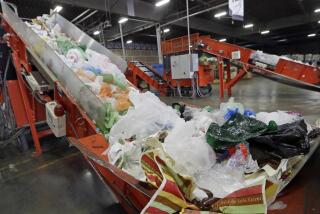ENVIRONMENT : ‘Plastics Police’ to Hit St. Paul Streets in July : New ordinance on packaging is among nation’s strictest and violators could be fined. Law may face court test.
ST. PAUL, Minn. — Come July, the “plastics police” could be out in force here, issuing fines to grocers and restaurants selling food and drink in the new contraband: plastic containers.
A city ordinance to be enforced starting July 1 will impose some of the strictest packaging regulations in the nation. They will ban ubiquitous plastics such as sandwich “clamshells” and, eventually, plastic cups, deli containers and a whole host of throwaways.
In groceries, milk and soft drink bottles will be spared, because the city expects to recycle them. But other plastic food containers--for things like yogurt, maple syrup or salsa--will gradually be banned. Grocers will be forced to find alternatives, such as paper and glass--or face fines.
Across the Mississippi River in Minneapolis, an identical ordinance kicks in at the same time but will be enforced differently. There, plastic bottles, soon to be followed by plastic cups and trays, are recycled and will escape the ban.
“The Minneapolis and St. Paul ordinances appear to be the most comprehensive ones to be actually implemented in the country,” said Nancy Skinner, executive director of Local Solutions to Global Pollution, a nonprofit Berkeley, Calif., group. “It’s great.” But whether the rules prove workable--and withstand a possible court challenge--remains to be seen.
The laws will effectively ban packaging that is not returnable or recycled. They will also force restaurants to start on-site recycling. Paper products, plastic wrap and microwave trays are exempt. Most of the metro area already recycles glass, cans, newsprint and corrugated cardboard, so those are off the hook, too.
Supporters say that, if the programs work in the Twin Cities and five adjacent suburbs, an area of 2.3 million people, they may help solve a major problem--how to cut the piles of garbage sent to landfills and waste incinerators.
These cities are among a growing list of 100 or more across the country that have laws on recycling or food packaging. Communities with partial controls on plastic packaging include Berkeley, which has banned fast food polystyrene containers, West Hollywood and Carmel, Calif., and East Brunswick and Newark, N. J., Skinner said.
Pressure from environmentalists has already worked on some companies. McDonalds, for example, recently scrapped plastic packaging in favor of paper and will recycle on site as much of its waste as possible.
But some grocers and restaurateurs predict marketplace mayhem as they try to juggle rules and regulations that may vary from one jurisdiction to the next.
“It’s going to be a mess,” predicted Francis Fitzgerald, lobbyist for the Council for Solid Waste Solutions, a Washington, D.C.-based plastics trade group.
“There are two ways to go about it,” said Susan Vadney, spokeswoman for the Council for Solid Waste Solutions, whose members help produce 59 billion plastic bottles and containers each year. “You can go about it in a negative and threatening way or a positive and cooperative way.” An estimated 500 to 1,000 mostly voluntary programs across the nation do the latter, she said.
The council was able to ward off a plastics ban in Minneapolis. It helped design a pilot recycling program and even leased the city a high-tech recycling truck.
The program went citywide in November. Today, more than 100,000 households recycle all types of food and non-food plastic bottles, along with other recyclables. Soon, they will be able to throw in their plastic deli and meat trays. Participants pay lower garbage fees.
So far, the city has been collecting 2.2 tons of plastic every day.
But the trade group’s efforts failed in St. Paul. “Ideally, we’d like to shift away from plastics altogether, toward glass and cans,” said Bob Cudahy, a St. Paul City Council legislative aide. After all, plastics are derived from non-renewable petroleum, he said. And recycling markets are uncertain at best for anything but high density polyethylene (HDPE) and polyethylene terephthalate (PET), plastics used in milk jugs and soda bottles, he said.
“The consumers are the ones who are going to scream like stuck pigs (if certain plastics are banned in St. Paul), because they like plastic,” said Ronald Fish, executive vice president of Rainbow Foods, a Twin Cities grocery chain with 26 stores. Rainbow stocks 55,000 cases of plastic-container yogurt every month and does not look forward to switching.
Fish said Rainbow Foods plans to go along with the new ordinances but warns that he cannot be sure about anybody else. “I expect our suppliers will be filing for exemptions and may sue,” he said.
“Once you take all the politics and the do-gooders out of it . . . plastics aren’t the villain,” Fish said. “The real problem is waste disposal and packaging of all types.”
More to Read
Sign up for Essential California
The most important California stories and recommendations in your inbox every morning.
You may occasionally receive promotional content from the Los Angeles Times.










